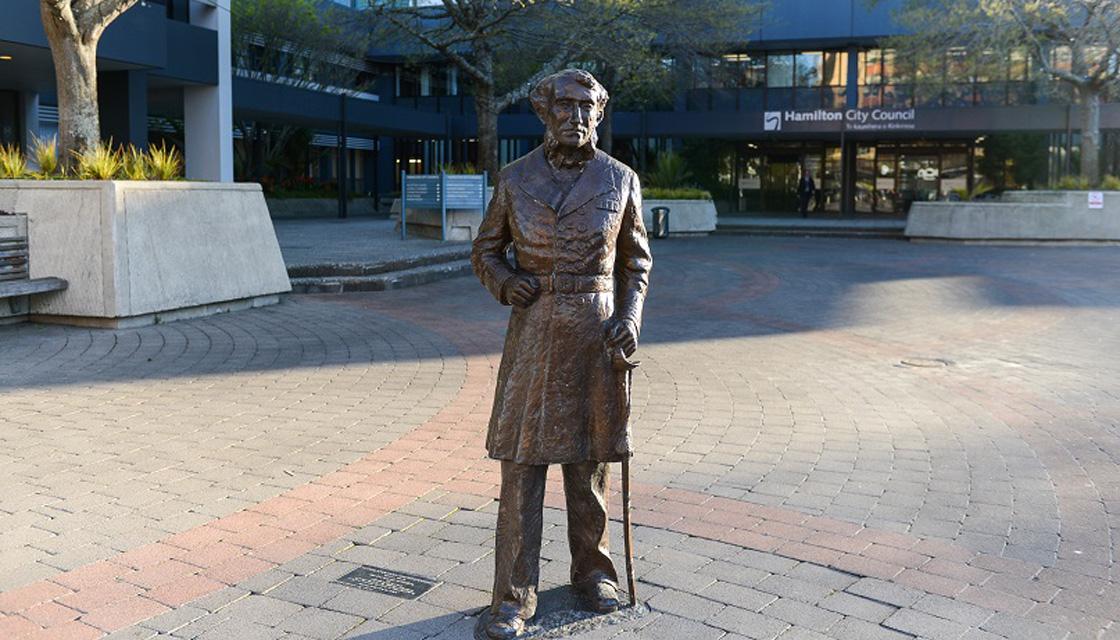Some Waikato Māori say glorifying colonial-era figures with statues is a daily reminder of the devastating effects of British imperialism and its ongoing impacts.
Hamilton City Council contractors this morning removed the statue of British army captain John Hamilton from the centre of town, after a formal request from the Waikato-Tainui iwi.
The removal has revived a wider debate about what should be done - if anything - with colonial-era monuments and names around the country.
This morning in Hamilton's Civic Square, there was applause as the statue of John Hamilton was taken down and carted off.
It was notably gentle and controlled, compared to the fate of other colonial-era statues around the world in recent weeks - some torn down, others beheaded.
Captain Hamilton died leading British forces in the Battle of Gate Pā in 1864, regarded as one of the most important battles of the New Zealand Wars.
Local man Kip Ormsby said the statue needed to be removed from public areas because it represented a painful time in history for Māori.
"I just believe it should go. Yes, it is a part of history, but for Māori people it's not a good part of history," Ormsby said.
"So why are we glorifying it for Māori people to see it every day? We believe he is responsible for a lot of the atrocities that happened to our people."
Ormsby said the statue should be in a museum, with a plaque outlining his full history, allowing people to make up their own minds about what sort of character he was.
The Waikato-Tainui iwi formally requested the statue be removed last year.
The iwi's chair Rukumoana Schaafhausen said they were elated with the decision and the council had done the right thing.
"It really was a stark reminder of the devastating actions of the colonial powers in the 1800s that resulted not just in the confiscation of our land, but the impact that it had on us as a people, which has flowed through to today. That's really what it reminds us of," she said.
The statue's removal is only one part of a longer-term conversation the iwi is having with the council - they have been working together for more than a year on a review of culturally sensitive names and sites.
The removal of the statue of the city's namesake begs the obvious question of whether the city should be renamed.
"We certainly favour Kirikiriroa over Hamilton," Schaafhausen said. "Kirikiriroa was acquired as a result of the New Zealand Settlements Act passed in 1863, and that resulted in just over 1.2 million hectares of our land being confiscated.
"The name Hamilton does really confront us as the stark reminder of the raupatu - the confiscations."
There were mixed reactions from those in town today.
"I don't agree with [the removal], I think it's fine where it is," one said.
"Why are we all having our symbols of what was bad in those days being revered now?" said another.
"Absolutely not. It's history! We've got history all over the place."
"He didn't do anything for Hamilton, did he. Apparently he never set foot in the city," another said.
As to where it should go, nothing had been decided. Hamilton City Council said there were suggestions people were planning to forcefully remove the statue, which could have damaged the integrity of the underground carpark it was sitting on.

Council chief executive Richard Briggs said the statue had been taken to a 'secure location' while a discussion was had about where it should end up, which the community would have a say in.
New Zealand First leader Winston Peters sent out a searing press release, saying he was "disgusted" at the "wave of wokeism", and that people proposing to pull down the statues should "grow up".
National MP Simeon Brown said removing statues like this was erasing history.
"We need to look at our history - the good, the bad and the ugly. We need to have mature conversations about it. Simply going and tearing down artefacts or statues of people we dislike based on our values now is an incredibly immature response to questions and discussions which should be had," Brown said.
The place of other statues and sites around the country has also been questioned.
South Island town Picton was named after British army officer Sir Thomas Picton, whose brutal years as governor in Trinidad when it was under British rule earned him the name the 'Tyrant of Trinidad'.
Marlborough District deputy Mayor Nadine Taylor has called for a discussion to formally add the Māori name, Waitohi.
"We're informally using it as a dual Waitohi/Picton interchangeable name anyway. Is this something we should develop?" Taylor said.
Taylor said she did not think Thomas Picton had travelled to New Zealand at all, so the link between the town and the officer was distant.
RNZ

